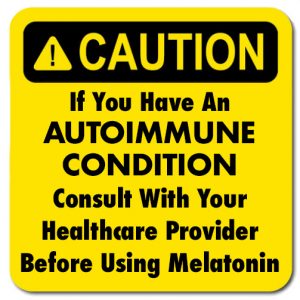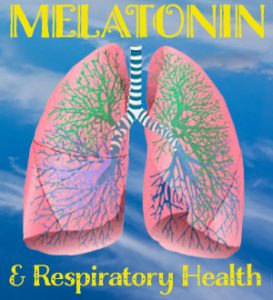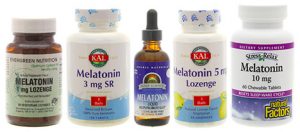Versatile Melatonin: Not Just for Sleep Anymore! ~ Part 2
Versatile Melatonin:
Not Just for Sleep Anymore!
In Part 1 of this newsletter we learned that melatonin is not produced solely by the pineal gland, as previously thought. Research now suggests that it is also produced in the bone marrow, thymus, as well as some gastrointestinal cells. Each of these influences the immune system and melatonin seems to be inextricably linked with healthy immune function. Receptors for melatonin are found throughout the body including immune system cells.
Anti-inflammatory Protection & Immune Influence
 Many of us know that melatonin is linked to circadian rhythm in the body. But did you know that nearly all immune cells have a circadian variation which is influenced by sleep? During nocturnal sleep, the number of white blood cells (monocytes), part of the innate immune system, is lowered. During the day, levels then rise again in the following afternoon and evening. Prolonged sleep disruption has been shown to induce a pro-inflammatory state. Ultimately, melatonin influences the circadian variation of immune response as well as inflammatory cytokines.
Many of us know that melatonin is linked to circadian rhythm in the body. But did you know that nearly all immune cells have a circadian variation which is influenced by sleep? During nocturnal sleep, the number of white blood cells (monocytes), part of the innate immune system, is lowered. During the day, levels then rise again in the following afternoon and evening. Prolonged sleep disruption has been shown to induce a pro-inflammatory state. Ultimately, melatonin influences the circadian variation of immune response as well as inflammatory cytokines.
Melatonin has been shown to lessen the detrimental pro-inflammatory effects of a sleepless state. It has also been shown to increase natural killer cell production and reduces levels of Tumor Necrosis Factor (TNF-α), a marker of high inflammation. Many human studies have shown that in conditions associated with chronic inflammation melatonin reduces levels of C-reactive protein, also a marker for inflammation.
Melatonin for Respiratory Health
 Melatonin has been shown to improve certain markers of lung function as well as to reduce pulmonary (lung) inflammation. Higher levels of melatonin are associated with positive outcomes in respiratory illness, as has been shown in human studies. Several studies involving newborns with respiratory distress syndrome (RDS), showed that high doses of melatonin dramatically lowered inflammatory markers such as TNF-α and Interleukin 8 (IL-8) in their lungs in addition to reducing the occurrence of sepsis. Pulmonary function was improved in all babies receiving the melatonin. Other conditions such as COPD, asthma and pulmonary fibrosis have shown airway inflammation to be improved with melatonin therapy.
Melatonin has been shown to improve certain markers of lung function as well as to reduce pulmonary (lung) inflammation. Higher levels of melatonin are associated with positive outcomes in respiratory illness, as has been shown in human studies. Several studies involving newborns with respiratory distress syndrome (RDS), showed that high doses of melatonin dramatically lowered inflammatory markers such as TNF-α and Interleukin 8 (IL-8) in their lungs in addition to reducing the occurrence of sepsis. Pulmonary function was improved in all babies receiving the melatonin. Other conditions such as COPD, asthma and pulmonary fibrosis have shown airway inflammation to be improved with melatonin therapy.
Anti-Infective Effects & More
 Melatonin has also been investigated as a treatment for (severe) infections. In sepsis, for instance, inflammation and oxidative stress contribute to organ failure. The hormone’s anti-inflammatory, antioxidant and immuno-modulatory properties have shown to benefit this life-threatening condition in which key body antioxidants are depleted as well as melatonin production in the pineal gland. Several animal studies have revealed melatonin to reduce viral load and in combination with other antiviral medication it has a synergistic effect.
Melatonin has also been investigated as a treatment for (severe) infections. In sepsis, for instance, inflammation and oxidative stress contribute to organ failure. The hormone’s anti-inflammatory, antioxidant and immuno-modulatory properties have shown to benefit this life-threatening condition in which key body antioxidants are depleted as well as melatonin production in the pineal gland. Several animal studies have revealed melatonin to reduce viral load and in combination with other antiviral medication it has a synergistic effect.
Researcher Dr. Roman Rozencwaig is one of the foremost melatonin authorities in the world. He believes that, in higher doses than typically used to improve sleep, melatonin can benefit immunity through multiple mechanisms and thus act as an antibacterial, an antiviral and even be beneficial for parasitic infections. His research has shown that pre-treatment with melatonin in respiratory-virus-infected mice resulted in marked reduction of acute lung oxidative injury as well as dangerous inflammatory cytokines. This has implications for use in other respiratory infections.
Rozencwaig’s research, spanning more than 30 years, has also shown melatonin to regulate stem cell function, promote apoptosis (cell death) of cancer cells and to regulate and balance bone formation and loss. One interesting find was that people who had been taking melatonin regularly seem to have fewer upper respiratory infections.
All in all, there is much more than just improved sleep for people who supplement with melatonin. Dr. Rozencwaig recommends that people start with 0.5 mg to 3 mg in the evening. As people age, it may be beneficial to increase the dose to 5 mg, depending on health. (Using a liquid melatonin makes it much easier to customize dosing.)

Back to Blog